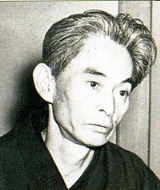
short story
writer and novel
ist whose spare, lyrical, subtly-shaded prose works won him the Nobel Prize for Literature in 1968, the first Japanese author to receive the award. His works have enjoyed broad international appeal and are still widely read.
Born in Osaka
, Japan
, into a well-established doctor's family, Yasunari was orphaned when he was four, after which he lived with his grandparents.
Because you cannot see him, God is everywhere.![]()
国境のトンネルを越えると雪国であった。夜の底が白くなった。![]()
From the way of Go, the beauty of Japan and the Orient had fled. Everything had become science and regulation. The road to advancement in rank, which controlled the life of a player, had become a meticulous point system. One conducted the battle only to win, and there was no margin for remembering the dignity and the fragrance of Go as an art.![]()
Maybe vagueness has been good for me. The word means two different things in Tokyo and Osaka, you know. In Tokyo it means stupidity, but in Osaka they talk about vagueness in a painting and in a game of Go.![]()
Seeing the moon, he becomes the moon, the moon seen by him becomes him. He sinks into nature, becomes one with nature. The light of the "clear heart" of the priest, seated in the meditation hall in the darkness before the dawn, becomes for the dawn moon its own light.![]()
The winter moon becomes a companion, the heart of the priest, sunk in meditation upon religion and philosophy, there in the mountain hall, is engaged in a delicate interplay and exchange with the moon; and it is this of which the poet sings.
![]()

